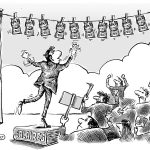Epic against Apple, the next Battle
Beyond the judicial controversy, the issue of monopoly position and their procession of distortions of free competition is resting.
Epic’s lawsuit against Apple once again raises the issue of abuses of the dominant position of GAFAM, which is already the target of much criticism and controversy. The Tech giants defend themselves by highlighting the specific nature of their model, or the presence of competitors, who would deny the monopoly nature of their position.
The issue clearly goes beyond the case itself, in which Epic has found itself with important support in the United States as well as in Europe for that matter. Apple will argue that its phones are not the only ones in the world, nor its system. But in the United States, their dominant position – almost 80% of the market, 50% of sales in 2020 – is hardly in doubt. The situation is best described as one of Monopsony, a term that refers us to our old economics textbooks, where we see the domination of one on its suppliers. The gatekeepers dominate their market and impose their prices. As the economist Thomas Philippon points out in his recent book1, the lack of competition, the “negative” concentration (he wants to distinguish between “good” and “bad” concentration as for cholesterol), produce lasting economic effects on prices in the long run. Eventually these systems kill innovation, investment, and negatively affect wages and employment. Reflecting on the weight of lobbyists, their influence on legislators and judges, the author shows how productivity has eroded in many sectors in the United States over the past two decades, gradually pushing prices up in air transport or telecoms, without improving the quality or wages.
Eventually these systems kill innovation, investment and negatively affect wages and employment
For long now, GAFAM have also been accused of using the so-called “killer acquisitions” practices to preserve their position. True, they certainly seem to value start-ups at heights that their creators may not have hoped for, but also can “kill in the bud” any competitive development.
Will we have to do without the AppStore then? That’s not the point! Especially since the platform provides an essential service to app developers. But how do we ensure that everyone has the best chance? Untangling the abusive market power share from legitimate remuneration will be complex. And what about Google or Facebook, or Amazon? The demonstration remains difficult, as shown by the long European procedures against the internet giants. It now seems certain that the revitalization of anti-trust laws, their more rigorous enforcement, is gaining ground among decision-makers, aware that justice or market forces will not suffice. The appointment of Lina Khan as head of the U.S Federal Trade Commission, testifies to this awareness. In Europe, the Commission is introducing its Digital Market Act, which is designed to give suppliers and customers on large digital platforms “fair” access to markets, wider choice and increased competition. In short, it shows its willingness to no longer allow them to “(…) to use unfair practices towards the business users and customers that depend on them to gain an undue advantage.”
Revitalization of anti-trust laws, their more rigorous enforcement, is gaining ground among decision-makers
Even if the trial of the moment confirms Apple’s position and strengthens the company in its model, the case will probably not be closed. The Biden Administration’s rallying to these issues may well give a boost to the implementation of new standards on both sides of the Atlantic, and above all revive competition whose effects on prices and purchasing power as well as on innovation and employment could prove far more significant. In the meantime, while the pandemic recedes and with it the positive impact on their business, the prospect of the big Tech falling a little off their pedestal does not satisfy the markets. Joe Biden, who wants to be the president of the middle classes, is part of the American tradition of more – not less – competition to support their wellbeing.
At least in its home market. This does not mean less rigor against China, on the contrary!
1 «The great reversal: how America gave up on free market», The Belknap Press of Harvard University Press, 2019
Original in French @ allnews.ch® May 10th edition -Cartoon by ©Barret



